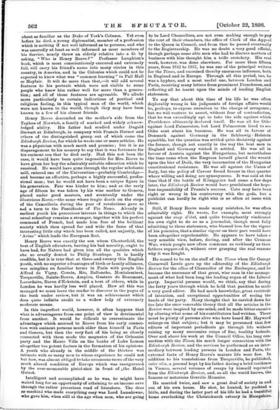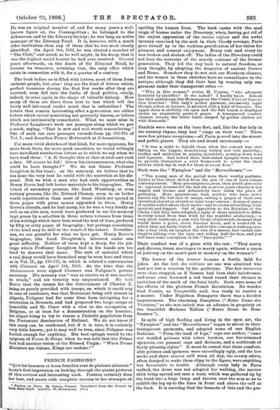He married twice, and saw a great deal of society
in and out of his own house. He shot, he hunted, he yachted a little, and during the latter part of his life he had a beautiful home overlooking the Christchurch estuary in Hampshire. Ile was an original member of, and for many years a well- known figure at, the Cosmopolitan ; he belonged to the Athenazum and to the Literary Society; he was long an active manager of the Literary Fund. It. is, however, with a much older institution than any of these that he was most closely identified. On April 9th, 1861, he was elected a member of "The Club," and noted, as he well might, in his diary, that it was the highest social honour he had ever received. Several years afterwards, on the death of Sir Edmund Head, he became its treasurer, retaining that, the only office which exists in connection with it, for a quarter of a century.
The book before us is filled with letters, most of them from eminent people, but, alas ! they are the kind of letters which, perfect treasures during the first few weeks after they are received, soon fall into the limbo of dead politics, rarely, indeed, to arise again in the shape of valuable history. How many of them are there from first to last which tell the fairly well informed reader much that is unfamiliar ? The letters that remain interesting after a generation are either letters which reveal something not generally known, or letters which are intrinsically remarkable. What we most miss in Professor Laughton's work are passages along which we put a mark, saying, "That is new and well worth remembering." One of such too rare passages extends from pp. 382-384 of Vol. I., and describes Prince Metternich at Johannisberg.
For more vivid sketches of that kind, for more epigrams, for more fresh facts, for more good anecdotes, we would willingly have sacrificed numberless letters as to which we say when we have read them : "A. B. thought this or that at such and such a date. Of course he did ! Given his circumstances, what else could he have thought?" We do not blame Professor Laughton in the least ; on the contrary, we believe that he has done the very best he could with the materials at his dis- posal. But we wish a man who had such opportunities as Henry Reeve had left better materials to his biographer. The letters of secondary persons, like Lord Westbury, or even tertiary persons, like Mr. Edward Cheney, seem to us better worth republication than most of those which are quoted in these pages with great names appended to them. Henry Reeve's friends, and he had many, for he was a very kindly as well as an able man, would have preferred to see his memory kept green by a selection in three octavo volumes from those of his writings which have best stood the teat of time, prefaced by fifty or sixty pages of biography ; but perhaps something of the kind may be still in the womb of the future. Neverthe- less, we are grateful for what we have got. Henry Reeve's biographer, like Lord Houghton's, laboured under one great difficulty. Neither of them kept a diary, for the jot- tings which Professor Laughton had in his hands are too brief to deserve that name. The sort of material which a real diary would have furnished may be seen here and there as in Vol. II., pp. 110-112, in which is related a conversation with Circourt on April 5th, 1865. At the time that the Ordonnances were signed Circourt was Polignac's private secretary. His memory was "wax to receive as it was marble to retain," and his veracity was unquestioned. He told Reeve that the reason for the Government of Charles X. being so poorly provided with troops, on which it could rely in case of resistance, was that Bourmont being still absent in Algeria, Polignac had for some time been intriguing for a revolution in Brussels, and had prepared two large camps at Luneville and St. Omer with a view to the occupation of Belgium, or at least for a demonstration on the frontier; his object being to try to rescue a Catholic population from the Protestant domination of Holland. We do not know if this story can be confirmed, but if it is true, it is certainly very little known; yet it may well be true, since Polignac was foolish enough for anything. His beet epitaph would be the epigram of Pozzo di Borgo when he was told that the Prince had had another vision of the Blessed Virgin : "When Prime Ministers see visions, Kings are undone !"











































 Previous page
Previous page